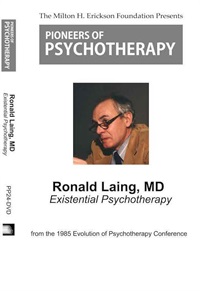Ronald Laing, MD - Existential Psychotherapy, 12/12/1985, Video Stream More info »
Ronald Laing, MD - Existential Psychotherapy
- Average Rating:
- Not yet rated
- Topic Areas:
- Clinical Demonstrations | Psychotherapy | Existential Therapy | Religion | Schizophrenia
- Categories:
- Pioneers of Psychotherapy | Evolution of Psychotherapy | Evolution of Psychotherapy 1985
- Faculty:
- Ronald Laing, MD
- Course Levels:
- Master Degree or Higher in Health-Related Field
- Duration:
- 01:11:00
- Copyright:
-
Dec 12, 1985
- Publisher:
- The Milton H. Erickson Foundation Press
- License:
- Never Expires.
Description
Description:
Ronald Laing (1985) interviews a home-less woman diagnosed with paranoid schizophrenia. Her presenting complaint is that her brain does not work right and that people are out to get her. Laing relates to the client and explores her theories of human conspiracy, the power of the mind and mind reading, issues of Christianity, and how these concepts relate to her.
Educational Objectives:
- To list existential techniques.
- To know the importance of fitting the techniques to the patient.
From conference EP95-CP13-DVD
*Sessions may be edited for content and to preserve confidentiality*
Credits
Faculty

Ronald Laing, MD Related Seminars and Products
Ronald David Laing, usually cited as R. D. Laing, was a Scottish psychiatrist who wrote extensively on mental illness – in particular, the experience of psychosis. R.D. received his M.D. from Glasgow University. Laing's name comes to mind when one thinks of practitioners who have been most effective at challenging prevailing medical thinking on schizophrenia. He has practices psychotherapy for more than 35 years and has authored 11 volumes.
Laing teaches and practices in London. Formerly he served as Chairman of The Philadelphia Association; was associated with the Tavistock Clinic; and was a Fellow of The Foundations Fund for Research in Psychiatry.


